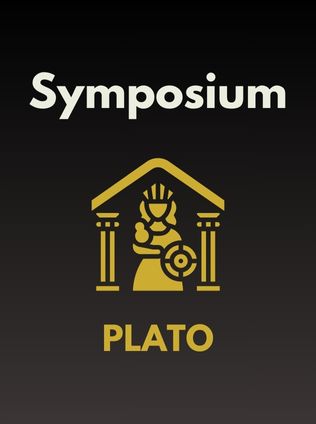
About the Author
Plato, born around 427 BCE in Athens, is considered one of the most influential philosophers in Western history. A student of Socrates and the teacher of Aristotle, Plato's works have shaped the foundation of philosophy, particularly in ethics, metaphysics, and political theory. His writings are primarily in the form of dialogues, with characters engaging in debates and discussions to explore complex ideas. Plato’s method of using dialogues allows readers to see the development of ideas through the interaction of different viewpoints, often leading to more questions than answers, which is characteristic of his philosophical style.
The "Symposium," one of Plato's most famous works, is a dialogue that explores the nature of love through a series of speeches by various characters. The setting is a banquet, or symposium, where the participants, who are notable figures from Athenian society, each give their interpretation of love. This dialogue not only delves into the nature of love but also touches on broader themes such as the pursuit of truth, the role of beauty, and the connection between love and wisdom. Through the "Symposium," Plato offers a rich and multifaceted exploration of love that has continued to influence philosophical thought for centuries.
Main Idea
The central theme of the "Symposium" is the exploration of eros, or love, in its various forms. The dialogue examines love not only as a powerful force in human relationships but also as a driving force behind the pursuit of wisdom and the divine. Through the speeches of different characters, Plato presents love as a multifaceted concept that encompasses everything from physical attraction to the highest forms of philosophical contemplation. The "Symposium" ultimately portrays love as a journey that leads individuals from the desire for physical beauty to the love of pure, abstract beauty and truth.
Plato's "Symposium" is not just a treatise on love but a profound inquiry into the nature of human desire, the role of love in the pursuit of knowledge, and the connection between love and the divine. The dialogue suggests that love is the force that drives us to seek something greater than ourselves, whether through relationships with others or through the contemplation of eternal truths. By exploring the different perspectives on love presented in the "Symposium," Plato invites readers to reflect on the deeper implications of love in their own lives.
Table of Contents
- Introduction to the Characters and Setting
- Phaedrus's Speech on Love as Virtue
- Pausanias’s Distinction between Common and Heavenly Love
- Eryximachus’s Expansion on Love as a Universal Force
- Aristophanes’s Myth of the Origin of Love
- Agathon’s Praise of the God of Love, Eros
- Socrates’s Rebuttal and the Teachings of Diotima
- Diotima’s Ladder of Love and the Ascent to Beauty
- Alcibiades’s Speech on Socrates and the Nature of Desire
- Conclusion: The Philosophical Implications of Love
Introduction to the Characters and Setting
The "Symposium" is set in the house of Agathon, a young and accomplished tragedian, during a banquet that he hosts to celebrate his victory in a dramatic competition. The setting is significant because the symposium was a central social institution in ancient Athens, where men gathered to drink, discuss, and engage in intellectual conversation. The dialogue is framed as a retelling of the events by Apollodorus, who heard the story from Aristodemus, who was present at the banquet. This layered narrative adds a level of complexity and ambiguity to the dialogue, suggesting that what we read is not a direct account but a retelling that may include embellishments or omissions.
The characters in the "Symposium" are all notable figures from Athenian society, each bringing a unique perspective to the discussion of love. These include Phaedrus, a young aristocrat; Pausanias, a legal expert; Eryximachus, a physician; Aristophanes, a comic playwright; Agathon, the host and tragedian; Socrates, the famous philosopher; and Alcibiades, a handsome and controversial politician. Each of these characters represents a different aspect of Athenian culture and thought, and their speeches on love reflect their individual experiences, professions, and personalities.
The use of these historical figures allows Plato to explore a wide range of ideas about love, from the physical and romantic to the intellectual and spiritual. The dialogue’s setting at a symposium also emphasizes the social and communal aspects of love, as the participants are not only discussing love but also experiencing it through their interactions with one another.
Phaedrus's Speech on Love as Virtue
Phaedrus begins the series of speeches by asserting that love is the oldest and greatest of the gods, and the source of the highest virtues in human beings. He argues that love inspires individuals to achieve great deeds because they desire to earn the admiration and approval of their beloved. According to Phaedrus, love is a powerful motivator for both personal and communal excellence, as those who are in love are more likely to act honorably and avoid shameful behavior.
"Love is the greatest of heaven's blessings, and love will inspire us to noble actions." - Plato
Phaedrus’s speech highlights the motivational power of love, suggesting that it is the force that drives individuals to aspire to greatness. He cites examples from Greek mythology and history to illustrate how love has inspired heroic acts, such as the sacrifice of Alcestis for her husband and the courage of Achilles in avenging Patroclus. For Phaedrus, love is not just a personal emotion but a public force that shapes the character of individuals and, by extension, the society they live in.
Sign up for FREE and get access to 1,400+ books summaries.
You May Also Like
Freakonomics
A Rogue Economist Explores the Hidden Side of Everything
By Steven D. Levitt and Stephen J. DubnerIf You Tell
A True Story of Murder, Family Secrets, and the Unbreakable Bond of Sisterhood
By Gregg Olsen



















